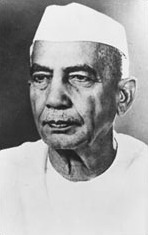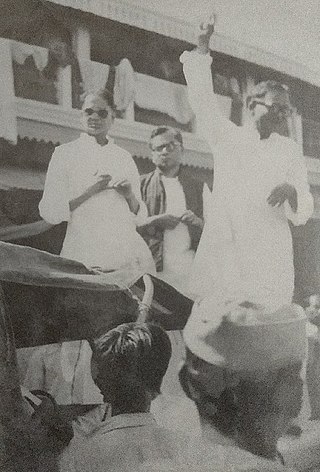This article needs additional citations for verification .(September 2013) |
Socialist Party has been the name of several political parties in India, all of which have their roots in the Congress Socialist Party during the freedom struggle.
This article needs additional citations for verification .(September 2013) |
Socialist Party has been the name of several political parties in India, all of which have their roots in the Congress Socialist Party during the freedom struggle.
Socialism had a late appearance in Indian politics and this was attributed to a preoccupation on the part of political activists with the independence movement. [1] Differences in class, political perspectives, and economic objectives were set aside in favor of securing freedom from the British colonial rule. Specifically, socialist doctrines were even seen as a liability due to its theme of class conflict, which could have weakened national forces in their struggle for freedom. [1]
Once the socialist movement emerged, the Indian concept turned out to be different due to its rejection of the orthodox Marxist dogma or the so-called scientific socialist doctrines that focus on the dictatorship of the proletariat. [2] The Indian model holds that socialism cannot be achieved through the State apparatus. One of its rationales stated that "If the State is looked upon as the sole agent for social reconstruction, we get nothing but a regimented society in which the State is all powerful and popular initiative is extinct and the individual is made a cog in a vast inhuman machine." [2] Indian socialism became aligned with the Gandhian principle that right outcomes would only be achieved through the right means. [2] Overall, it has clear links to traditional Indian thought and philosophical traditions. [1]
The original Socialist Party had its roots in the Congress Socialist Party (CSP), the socialist caucus of the Indian National Congress, which fused in 1948 with the Bolshevik-Leninist Party of India, Ceylon and Burma (BLPI). Hector Abhayavardhana of the BLPI became General Secretary of the new party. The Socialist Party was founded not long after India's independence when Jayprakash Narayan, Rambriksh Benipuri, Basawon Singh (Sinha), Acharya Narendra Dev led the CSP out of Congress. At the time, Congress's leader Jawaharlal Nehru held positions that were widely admired by the rank and file of the CSP.
Despite Jayaprakash Narayan's personal popularity, the Socialist Party won only 12 seats at the 1951 Indian general election, and its electoral fortunes did not improve. The SP merged with the Kisan Mazdoor Praja Party, which was formed by J.B. Kripalani, to form the Praja Socialist Party.

The Praja Socialist Party was an Indian political party in existence from 1952 to 1972. It was founded when the Socialist Party, led by Jayprakash Narayan, Acharya Narendra Deva, Ramvriksh Benipuri and Basawon Singh (Sinha), merged with the Kisan Mazdoor Praja Party led by J.B. Kripalani (formerly a close associate of Jawaharlal Nehru). A section led by Rammanohar Lohia broke from the party in 1955, resuming the name "Socialist Party".
In 1972, SSP was reunited with PSP, forming the Socialist Party. [3]
In 1974 and 1975, JP led satyagrahas against the government of Indira Gandhi and called for a 'Total Revolution' in the countryside. In response, Indira declared the two-year State of Emergency under which her own power was consolidated and JP was jailed. At that time, George Fernandes, chairman of the Socialist Party of India, who had faced prosecution for conspiracy against the government of Prime Minister Indira Gandhi, sought to obtain funding from the U.S. Central Intelligence Agency and the French government in order to organize underground sabotage activities. After an initial request to seek funding from the French government was turned down, U.S. diplomatic cables showed that he was "prepared to accept money from the CIA". [4]
After the Emergency, the Socialist Party joined with a number of other groups to form the Bharatiya Lok Dal, which fused in 1977 into Janata Party as an omnibus opposition to Congress Party rule.
The Samyukta Socialist Party was a political party in India from 1964 to 1972. SSP was formed through a split in the Praja Socialist Party (PSP) in 1964. In 1965, Ram Manohar Lohia merged his Socialist Party (Lohia) with SSP. In 1972, SSP was reunited with PSP, forming the Socialist Party. [3] The General Secretary of the SSP from 1969 to 1971 was George Fernandes.
In 1972, one faction of SSP led by Madhu Limaye and George Fernandes was reunited with PSP, forming the Socialist Party. In 1977, the Socialist Party combined with the Indian National Congress (Organization) , BLD and the Jan Sangh to form the Janata Party.
The Samajwadi Party, (Hindi translation: Socialist Party), is a political party which draws its lineage from the Janata Dal, Janata Party, Lok Dal and eventually Socialist Party as well.
In 2011, several socialist groups and individuals formed the Socialist Party (India), which intends to carry forward the legacy of the Socialist Party formed in 1948. The party was formed through a resolution passed by Mr. Pannalal Surana at the foundation conference on 28 May 2011, under the chairmanship of Prof. Keshav Rao Jadhav.
Party National Conference held at Wardha in Gujarath on 28–30 September 2021 elected Adv Thampan Thomas Ex MP from Kerala as president and Dr.Sandeep Pandey of UP as General Secretary.

Jayaprakash Narayan Srivastava, also known as JP and Lok Nayak, was an Indian independence activist, theorist, socialist and political leader. He is mainly remembered for leading the mid-1970s opposition against Prime Minister Indira Gandhi and calling for her overthrow in a "total revolution". In 1999, Narayan was posthumously awarded the Bharat Ratna, India's highest civilian award, in recognition of his social service. His other awards include the Magsaysay award for public service in 1965.

Chaudhary Charan Singh was an Indian politician and a freedom fighter who served as the 5th Prime Minister of India from 1979 to 1980 and the 3rd Deputy Prime Minister of India from January 1979 to July 1979. He served as 5th Chief Minister of Uttar Pradesh as a member of Bhartiya Kranti Dal. Charan Singh is known for his land and agricultural reform initiatives. On 26 January 2024, he was posthumously awarded India's highest civilian honour, the Bharat Ratna, by the Government of India. This was announced by the President of India Draupadi Murmu on 23 January 2024. He is widely regarded as the "Champion of farmers" after his life has been dedicated to advocating for the wellbeing and rights of farmers. He is the first leader outside the Indian National Congress who formed government in the northern India and became 5th chief minister of Uttar Pradesh.

The Janata Party abbreviated JP, lit. People's Party) is an unrecognized political party in India. It was founded as an amalgam of Indian political parties opposed to the Emergency that was imposed between 1975 and 1977 by Prime Minister Indira Gandhi of the Indian National Congress. In the 1977 general election, the party defeated the Congress and Janata leader Morarji Desai became the first non-Congress prime minister in independent modern India's history.

Samyukta Socialist Party, was a political party in India from 1964 to 1977. SSP was formed through a split in the Praja Socialist Party (PSP) in 1964. In 1965, Ram Manohar Lohia merged his Socialist Party (Lohia) with SSP and contested in 1967 Indian general election. In 1972, SSP was reunited with PSP, forming the Socialist Party. But in December 1972, SSP was recreated after the split in Socialist Party. One faction of SSP led by Madhu Limaye and George Fernandes wanted to merge with PSP but another faction led by Raj Narain resisted the merger with PSP.

Bharatiya Lok Dal was a political party in India. The BLD or simply BL was formed at the end of 1974 through the fusion of seven parties opposed to the rule of Indira Gandhi, including the Swatantra Party, the Samyukta Socialist Party, the Utkal Congress and the Bharatiya Kranti Dal. The leader of the BLD was Charan Singh.

The Congress Socialist Party (CSP) was a socialist caucus within the Indian National Congress. It was founded in 1934 by Congress members who rejected what they saw as the anti-rational mysticism of Gandhi as well as the sectarian attitude of the Communist Party of India towards the Congress. Influenced by Fabianism as well as Marxism-Leninism, the CSP included advocates of armed struggle or sabotage (such as Yusuf Meherally, Jai Prakash Narayan, and Basawon Singh as well as those who insisted upon Ahimsa or Nonviolent resistance. The CSP advocated decentralized socialism in which co-operatives, trade unions, independent farmers, and local authorities would hold a substantial share of the economic power.

The Praja Socialist Party, abbreviated as PSP, was an Indian political party. It was founded in 1952 when the Socialist Party, led by Jayaprakash Narayan, Rambriksh Benipuri, Acharya Narendra Deva and Basawon Singh (Sinha), merged with the Kisan Mazdoor Praja Party led by J. B. Kripalani.

Ram Manohar Lohia was an activist in the Indian independence movement and a socialist political leader. During the last phase of British rule in India, he worked with the Congress Radio which was broadcast secretly from various places in Bombay until 1942.

Jivatram Bhagwandas Kripalani, popularly known as Acharya Kripalani, was an Indian politician, noted particularly for holding the presidency of the Indian National Congress during the transfer of power in 1947 and the husband of Sucheta Kripalani. Kripalani was an environmentalist, mystic and independence activist who was long a Gandhian socialist, before joining the economically right wing Swatantra Party later in life.
Asoka Mehta was an Indian freedom fighter and socialist politician. He helped organize the socialist wing Congress Socialist Party of the Indian National Congress, along with Rambriksh Benipuri, Jaya Prakash Narayan, and was heavily involved in the politics and government of the city of Bombay.

Basawon Singh or Basawan Singh also known as Basawon Sinha, was an Indian independence activist and a campaigner for the rights of the underprivileged, and industrial and agricultural workers.

Raj Narain was an Indian freedom fighter and politician. He won in a famous electoral malpractice case against the then Prime Minister Indira Gandhi, which led to her disqualification and imposition of Emergency in India in 1975. He defeated Indira Gandhi during the 1977 Lok Sabha elections.

Yogendra Shukla was an Indian nationalist and freedom fighter, notable for his contributions in the state of Bihar. He was incarcerated in the Cellular Jail, also known as Kala Pani, and was a founding member of the Hindustan Socialist Republican Association (HSRA). Shula, in collaboration with Basawon Singh (Sinha), was also instrumental in establishing the Congress Socialist Party in Bihar.
The politics of Odisha are part of India's federal parliamentary representative democracy, where the union government exercises sovereign rights. Certain powers are reserved to the states, including Odisha. The state has a multi-party system, in which the two main parties are the nationalist Bharatiya Janata Party (BJP) and the regional, socialist Biju Janata Dal (BJD). The Indian National Congress (INC) has also significant presence.
The Kisan Mazdoor Praja Party, or Praja Party for short, was a political party of India. Established in 1951, it merged with the Socialist Party to form the Praja Socialist Party in the following year. The Andhra unit of the party, however, revived the old party under the name "Praja Party" and lasted for a few more years.

Chandra Shekhar, known as Jananayak, was an Indian politician who served as the 8th Prime Minister of India, between 10 November 1990 and 21 June 1991. He headed a minority government of a breakaway faction of the Janata Dal with outside support from the Indian National Congress. He was the first Indian Prime Minister who had never held any prior government office.

Elections in Karnataka, a state in India are conducted in accordance with the Constitution of India. The Assembly of Karnataka creates laws regarding the conduct of local body elections unilaterally while any changes by the state legislature to the conduct of state level elections need to be approved by the Parliament of India. In addition, the state legislature may be dismissed by the Parliament according to Article 356 of the Indian Constitution and President's rule may be imposed.
Elections were held in March 1952 for the Bihar Legislative Assembly. There were 276 constituencies with 50 of them being two-member constituencies. The Indian National Congress (INC) stormed into power. Shri Krishna Singh became the first elected Chief Minister of Bihar and Dr. Anugrah Narayan Sinha became the first Deputy Chief Minister cum Finance Minister of the state.
Puthanpurayil Ramunni Kurup was an Indian socialist leader and former minister of Kerala state. Born as the son of Govindan Nambiar and Kunjunjamma at Puthur near Panoor in present-day Kerala state, he was initiated into politics through Indian National Congress in 1935. He got attracted to the ideals of the socialist faction later and worked closely with various socialist parties such as Praja Socialist Party, Samyukta Socialist Party, Janata Party and Janata Dal. In 1967, he became cooperative, irrigation, and Devaswam minister in the EMS ministry. In 1996, he became minister for forests and transport in the E. K. Nayanar ministry. He resigned on 11 January 1999 after age-related ailments. He died on 17 January 2001. He was married to (late) K. P. Leelavathi and had four sons and four daughters, including former Kerala state agricultural minister K. P. Mohanan.
Sudhir Chandra Das was an Indian politician. During the struggle for Indian independence, he took part in the Salt, No-Tax and Quit India Movements. He represented Contai North and later Contai South in the West Bengal Legislative Assembly, becoming Minister for Animal Husbandry and Veterinary Services in 1969.